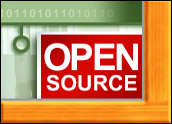
So here we are. Home prices and incomes are falling, foreclosures are rising, layoffs are multiplying, and wealth is evaporating. Everyone is looking for signs of stability, but each new day brings new despair and uncertainty.
Amidst the reckoning, it’s hard to imagine the future, but regardless, it will arrive soon enough. While different countries of the world deal with this economic crisis and its effects in different ways, it seems blatantly evident that the status quo has failed. From trickle-down — nay, voodoo — economics to proprietary software, We The People have been sold snake oils that have nasty side effects.
While plenty of the perpetrators and profiteers would be completely comfortable passing off various symptoms as the cause for Depression 2.0, it is essential we critically examine the ideas that got us to where we are and eliminate the incorrect theses from the curricula so as to allow future generations to experience new and different problems.
Software Secrets
Proprietary software didn’t single-handedly induce this economic collapse. Actually, maybe it did. Maybe it was proprietary software that allowed “investors” to get involved in credit default swaps that had no underlying mortgages, but that’s not the point here.
Proprietary software suggests information and processes can be privatized and that privatization of information and processes is a worthwhile endeavor.
It almost seems reasonable. Indeed, I have long argued that proprietary software has a place in and is not antithetical to Linux (so long as it complies with applicable licensing). Proprietary software, particularly operating systems, quickly becomes insidious, however, when it is the sole option.
Golden Handcuffs
User interfaces are more intuitive than ever before. People coming to technology for the first time are very fortunate to be able to accomplish so much in the digital world while having only a cursory understanding of the tools that make their experiences possible.
Here in the United States, most students learn about technology using proprietary software products and operating systems that have been meticulously designed to be simple for end users. Obviously one would rather use a system tailored to instinctive human behavior than, say, a PDP-7, but going to school and growing up with polished and closed-source systems comes with consequences.
One of the primary consequences is that only students who have an initial interest in technology will bother to explore further, while their peers may as well assume computers run on magic. Unfortunately, exploring closed source software has additional limitations, so even some would-be future technologists easily reach dead ends.
Perhaps worst of all is that the most savvy operators grow up using locked-down operating systems that reinforce the idea that the best they can do is someday offer their own children software with even better user interfaces and DRM.
Meanwhile, Overseas
In Russia, China, much of Europe, and parts of Latin America and Africa, governments and schools are switching to Linux-based systems. In Russia and China, they are doing so in reaction to WTO anti-piracy rules, whereas in Africa and Latin America, the migration relates more specifically to cost, but the effects are the same.
The young people in these countries are exposed to free and open source software so early that children who might not be technically inclined are nevertheless peripherally exposed to technology that will lead to greater understanding, if not interest. Simply knowing that software has source code and that operating systems have “guts” will shape students’ perspectives in ways that will allow them to become dramatically more technologically sophisticated and, as such, more economically productive than their point-and-click counterparts.
In this era where technology underlies most every aspect of existence, the consequences of languishing technology education manifest in a multitude of manners, one of which is the shift away from a unipolar world wherein the United States is a sole superpower.
Options Needed
Whereas the international community and the U.S. can doubtless survive and flourish in a multi-polar world, it’s less clear that anyone can succeed in the long-term using proprietary operating systems as part of their society’s foundation.
It’s fine and well to produce and use closed-source software and even operating systems for specific purposes, but raising generations of people on closed-source commercial software is a serious geopolitical and economic threat.
Jeremiah T. Gray is a LinuxInsider columnist, software developer, sysadmin and technology entrepreneur. He is a director of Intarcorp, publisher of the Linux-oriented educational comic book series, “Hackett and Bankwell.”


















































What an interesting proposition. I think the very thought provoking idea that closed source software and operating systems may be having a detrimental impact on our children should certainly be considered by those agencies responsible for educating our children. And with virtualisation surely the the lack of certain important proprietary software titles not working on linux et al, becomes trivial.
I moved over to linux a few years ago mainly out of the desire to learn something new. As with all things new this can be scary to start with. And if I hadn’t mislaid my xp install disk, may have given up at the first hurdle! However I now very rarely bother with anything but open-source.
Now my point to this is that children are like sponges and rarely show the fear of exploring new ideas (operating systems) as us. Perhaps it is time to make the changes…for the better of us all.